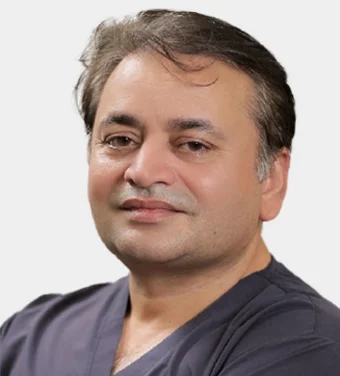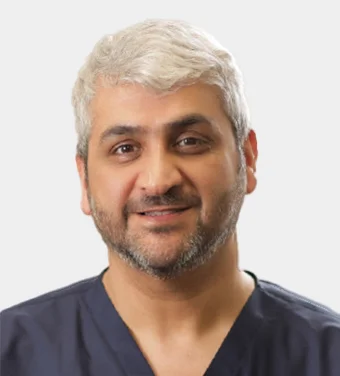
At IBS Hospital, our chordoma treatment combines advanced surgical methods with compassionate care. Our team of experts specializes in innovative techniques, ensuring precise tumor removal while prioritizing patient safety and recovery.
What is a Chordoma?
Chordoma is a rare type of bone cancer that usually develops at the base of the skull or in the spine. It is quite rare and generally affects people in the age group of 40 to 60 years. These tumors grow at a very slow pace; however, their treatment can be challenging due to their complex location. Even after treatment, the tumor can recur and may even metastasize to other areas of the body. Approximately 35% of these tumors originate in the base of the spine, another 35% develop in the skull base, and the remaining 30% occur within the vertebrae.
What are the common symptoms of Chordomas?
Chordomas are generally asymptomatic during the initial stages, and symptoms become evident only after the tumor has grown large enough to exert additional strain on the brain or spinal cord. The symptoms triggered by chordomas vary depending on the tumor’s location. The most common of these include:
- Double vision
- Blurred vision
- Severe headaches
- Facial numbness
- Facial pain
- Loss of bladder or bowel control
- Lower back pain
- Weakness in upper and lower limbs
What causes Chordomas?
The exact cause of chordomas is unknown, but they have been linked to mutations in the TBXT gene. The condition can be inherited, meaning that multiple members of a family may be affected.
How are Chordomas diagnosed?
The diagnosis of chordomas involves evaluating the patient’s medical history and a thorough assessment of the symptoms they are experiencing. If doctors suspect a chordoma, detailed imaging modalities are used to confirm the diagnosis. These
include:
- X-ray
- Computed Tomography (CT) scan
- Magnetic Resonance Imaging (MRI)
How are Chordomas treated at IBS Hospital?
Surgery is the preferred treatment option for managing patients with chordoma. This typically involves the complete surgical removal of the mass, while avoiding damage to vital brain structures. If the tumor cannot be entirely removed, a portion of it is carefully extracted to alleviate pressure and other symptoms.
Our team of experts that make it possible
Meet the team of highly specialised and experienced neurosurgeons, neurologists, orthopedicians, and other experts in the field of neurology and spine care. Our team is dedicated to providing personalised and compassionate care to each patient, with the goal of helping them achieve the best possible outcomes.

Dr. Vikas Gupta
Senior Neurosurgeon

Dr. Dewaker Sharma
Senior Neurosurgeon

Dr. Sachin Kandhari
Senior Neurosurgeon

Dr. Anup Gogoi
Senior Neurosurgeon

Dr. Ankur Dhandha
Anaesthetist

Dr. Gaurav Sharma
Senior Sports Physiotherapist

Dr. Sachin Samuel
Senior Neuro Physiotherapist

Dr Ankush Arora
Anaesthetist

Dr Amarjyoti Yadav
Anaesthetist
IBS Hospital Empowers Your Treatment with Cutting-edge Technology
We continuously incorporate cutting-edge technologies from around the world into our offerings, such as a surgical system that allows for precise and confident complex procedures. We use magnetic stimulation to treat certain neurological conditions and create personalised brain maps for tailored treatment plans. Nerve monitoring during surgeries ensures the nervous system is not compromised, and a robotic exoskeleton aids in mobility issues. Our goal at IBS Hospital is to provide the best care possible, utilising the latest and most innovative technologies available.


